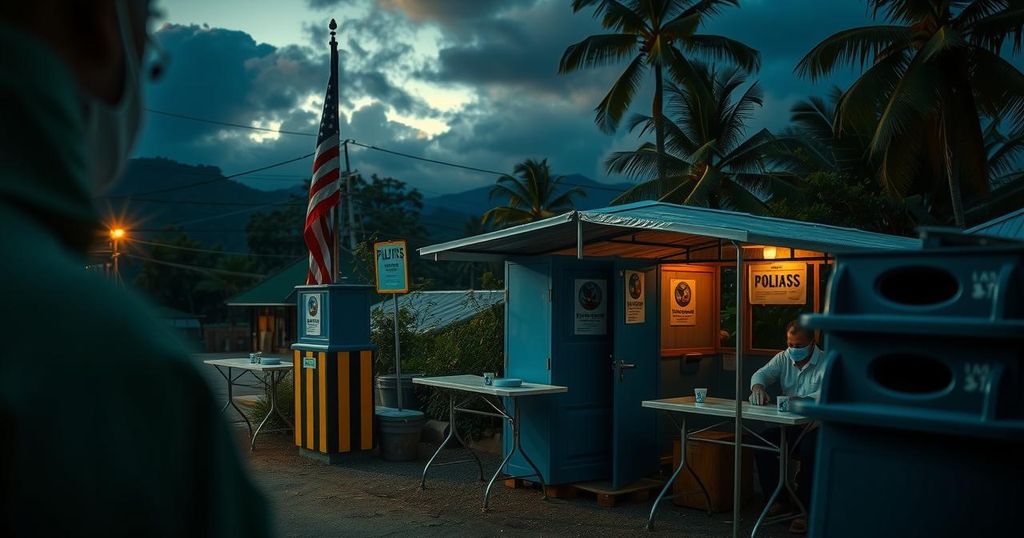Mauritius Parliamentary Elections Amid Scandal and Sovereignty Agreement

Mauritius held parliamentary elections influenced by a phone-tapping scandal and a recent sovereignty agreement over the Chagos Islands. Prime Minister Pravind Jugnauth’s re-election campaign faced challenges amidst public concerns regarding governance and civil liberties. Both major political alliances presented platforms focused on economic issues, with a notable voter turnout reported. Results are expected to clarify the future direction of this African democracy.
On Sunday, Mauritius held parliamentary elections amid an environment overshadowed by a phone-tapping scandal that had emerged earlier in the month. The elections were particularly significant, following a historic agreement whereby Britain ceded sovereignty of the Chagos Islands to Mauritius, resolving a long-standing territorial dispute. The current Prime Minister, Pravind Jugnauth, found his campaign for re-election undermined by the scandal, which involved the leaked recordings of political figures and journalists, prompting the government to impose a social media ban that was later rescinded due to public backlash. The contest for the 70-seat National Assembly featured two principal alliances: Jugnauth’s Militant Socialist Movement and the rival Alliance of Change led by former Prime Minister Navin Ramgoolam. Both parties expressed confidence in their chances to emerge victorious, focusing their platforms on alleviating poverty and addressing the rising cost of living. As the polls closed, voter turnout reached 70%, though definitive comparisons with previous elections were not provided. Election results are anticipated to be released on Monday. The safety of the electoral process was ensured through police presence at polling stations and monitoring from organizations including the African Union. Despite some allegations of potential election fraud from Ramgoolam, he ultimately stated that the voting process was largely uninterrupted. Jugnauth echoed this sentiment, asserting, “We are confident of winning because the people appreciate our record,” while also alleging opposition attempts to disrupt the electoral process. A particularly pressing concern is the economic and political stability of Mauritius, which has maintained a growing and stable economy since gaining independence in 1968. While GDP growth reached seven percent this year, there have been calls for greater diversification of the economy, alongside increasing worries regarding governance and corruption. Democracy expert Roukaya Kasenally remarked on the erosion of institutional checks and balances in recent years, highlighting scandals related to procurement during the pandemic and governmental abuses of power. Leadership in Mauritius has long been characterized by a small group of political families, with both Jugnauth and Ramgoolam continuing this tradition. The focus on corruption and nepotism has led to the rise of the new Linion Reform alliance, which seeks to present an alternative to the established political figures. The recent Chagos agreement, despite its significance, raises concerns about future relations with the United States, particularly under shifting political landscapes. Traditionally viewed as a model of democracy in Africa, the perceptions surrounding Mauritius’s governance are being challenged. The election results will signal whether the electorate opts for continuity under Jugnauth’s leadership or seeks change with Ramgoolam.
Mauritius is considered one of Africa’s most stable democracies, with a governance structure that has evolved since its independence from Britain in 1968. The nation’s economy, historically reliant on tourism, financial services, and textiles, has achieved significant growth, although recent years have raised concerns regarding governance, corruption, and political freedoms. The recent agreement for the sovereignty of the Chagos Islands illustrates the complex geopolitical dynamics affecting Mauritius and reflects its aspirations for greater autonomy. Political stability remains crucial for maintaining economic progress and civil liberties, with the electorate being influenced by both long-standing political families and emerging parties promising reform.
The recent parliamentary elections in Mauritius unfolded against a backdrop of political turmoil and a significant scandal, testing the resilience of its democratic institutions. With the population poised between established leadership and calls for reform, the forthcoming election results will be pivotal in shaping the future political landscape. Maintaining economic and political stability remains essential as the nation navigates both internal governance challenges and external geopolitical influences.
Original Source: www.news-expressky.com







